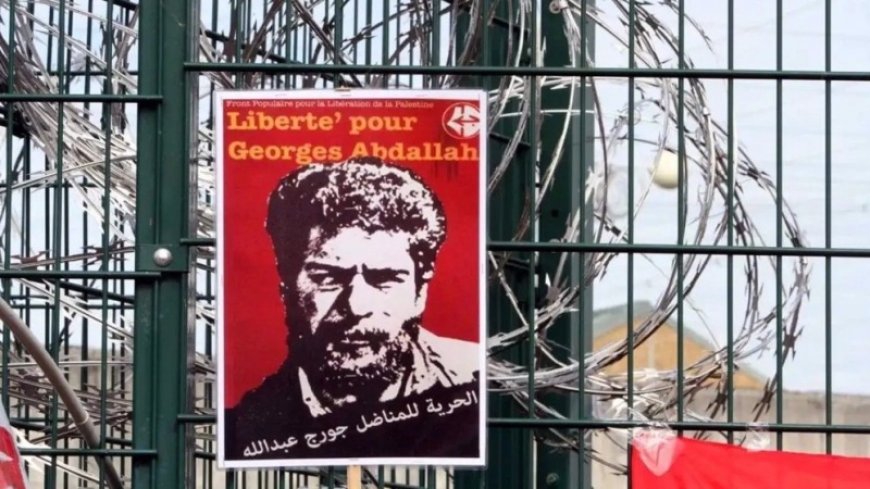The Release of Georges Ibrahim Abdallah: A Complex Debate on Justice, Politics, and Human Rights
The historic ruling of the French court on November 17, 2024, releasing Lebanese insurgent Georges Ibrahim Abdallah, who had been imprisoned for forty years, has caused much debate and controversy all over. Often referred to as the "Nelson Mandela of the Arab World," Abdallah's situation has long under international investigation. Following many legal fights with French courts authorizing his release three times despite strong resistance from the United States and Israel, his release, set for December 6, on the condition that he departs France and refrains from re-entering the country, comes after.

The historic ruling of the French court on November 17, 2024, releasing Lebanese insurgent Georges Ibrahim Abdallah, who had been imprisoned for forty years, has caused much debate and controversy all over. Often referred to as the "Nelson Mandela of the Arab World," Abdallah's situation has long under international investigation. Following many legal fights with French courts authorizing his release three times despite strong resistance from the United States and Israel, his release, set for December 6, on the condition that he departs France and refrains from re-entering the country, comes after.
Arrested in 1982, Georges Ibrahim Abdallah was involved in the deaths of Israeli envoy Yakov Barsimentov in Paris and American military commander Charles Ray. Charged with planning and carrying out these murders as part of a larger Palestinian-led opposition against Israeli policies in the area, he belonged to the Lebanese militant group, the Armed Revolutionary Factions (LARF). Although Abdallah was condemned to life in 1987, his trial has been harshly attacked for lacking specific proof to back up the charges leveled against him. His defense attorney even acknowledged working undercover for the government during the trial, therefore casting questions on the fairness of the court system.
Although Abdallah is imprisoned for a long period, his supporters contend that his case is one of political detention rather than a simple criminal one. Comparable to Nelson Mandela, who was also imprisoned for his anti-apartheid activity before to becoming a worldwide symbol of freedom and peace, Abdallah's release represents a triumph for human rights and justice to them. The scenario is far from straightforward, though, and the choice to free Abdallah exposes a number of important questions including the function of politics in the court system and the careful balancing between national security considerations and human rights.
Abdallah's Imprisonment: The Political Component
One cannot appreciate Abdallah's protracted detention apart from its political background. Political pressure, especially from the United States and Israel, both of whom view Abdallah as a dangerous terrorist, has hindered the repeated rulings of the French court system releasing him. These countries feel that his release would send a negative message, therefore undermining initiatives against terrorism and implying approval for the use of force against military people and diplomats.
On closer inspection, though, Abdallah's detention is a component of a more general political tactic France uses in its interactions with the Middle East. France has always positioned itself as a mediator in the area, juggling its ties to several political groups. Therefore, Abdallah's situation might more reflect the geopolitical dynamics between the West and the Arab world than it would of criminal justice or terrorism. Actually, a 2017 poll showed that about seventy percent of French people disagreed with Abdallah's release, which reflects the general concern about his possible freedom. However, the continuous acceptance of his release by French judges implies that political demands and public opinion might not coincide with legal reasons.
Human Rights and Justice: An Argument Divisive
Human rights-wise, Abdallah's case begs significant issues concerning the nature of justice and the rights of political prisoners. Opponents of his ongoing custody contend that his case shows the extent to which political factors may skew the court system. Characterized by a lack of strong evidence and the admission by Abdallah's attorney of being an informant for the French government, Abdallah's trial suggests that his detention was more about silencing a political figure opposing Western intervention in the Middle East than about justice.
One idea that makes one very emotional is "political prisoners". In democratic countries, where the legal system is supposed to be objective, cases like Abdallah's challenge the objectivity of court systems when burdened by political impact. Having spent four decades behind bars—longer than most people serve for serious crimes—sparks discussions on whether such long terms offer a greater social benefit or rather reflect a punitive, political objective.
Connotations of Abdallah's Release
Georges Ibrahim Abdallah's publication has the resonance going beyond the personal level. It might represent changing perceptions of political prisoners and the treatment of people judged enemies of the state. His liberation will probably inspire discussions on the importance of judicial independence and openness as well as the wider consequences of political violence in areas of strife. For some, Abdallah's release marks a victory of justice over politics; for others, it will confirm worries that acts of terrorism are rewarded, therefore complicating the worldwide battle against extremism.
In the Middle East specifically, Abdallah's release might affect popular opinion of France and its involvement in the area. Long positioned as a champion of diplomacy, a nation may find itself at conflict with both its allies and its detractors as it balances its legal responsibilities with its geopolitical goals.













































